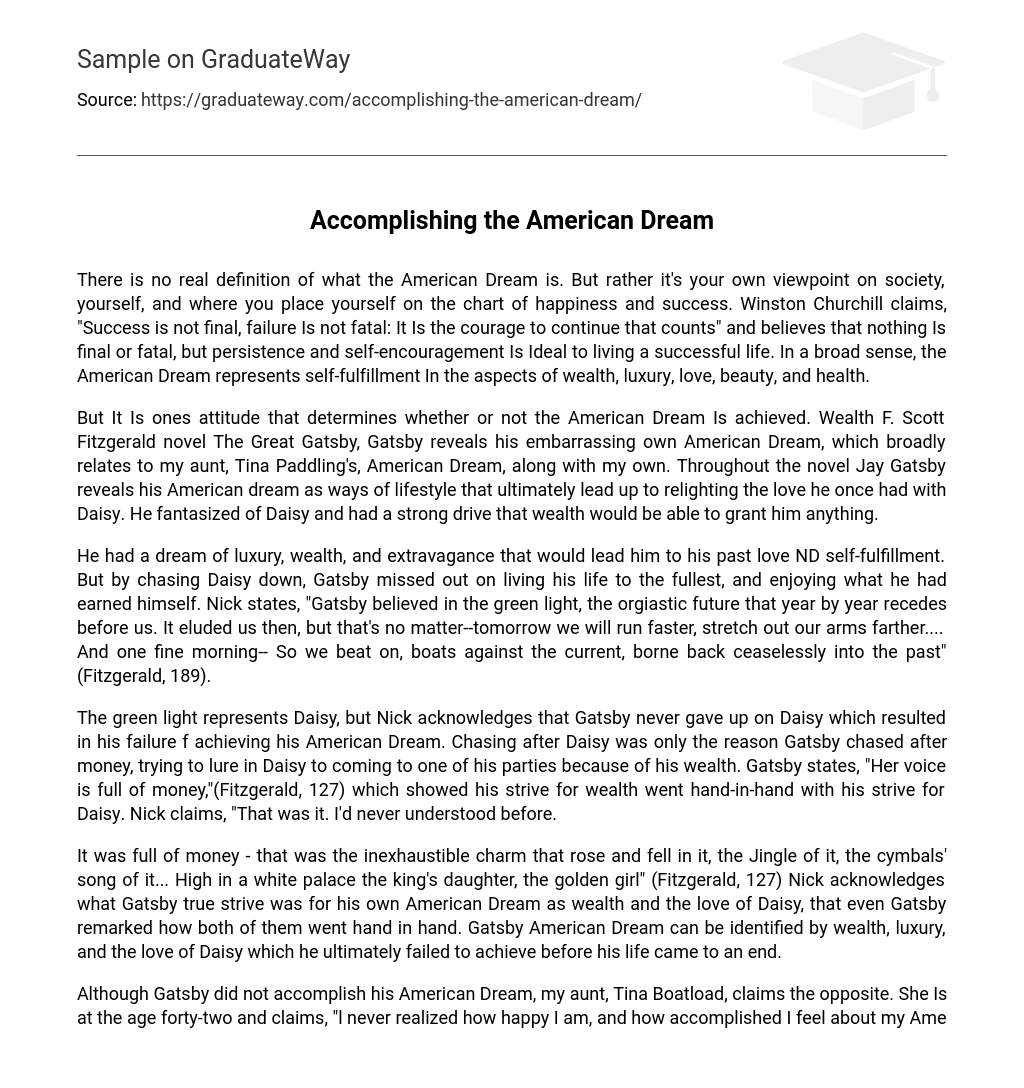The American Dream is not easily defined and varies based on an individual’s viewpoint regarding society, self, and personal happiness and achievements. Winston Churchill contends that success is not absolute, nor is failure irreparable; rather, it is the bravery to continue onward that truly counts. He maintains that nothing is everlasting or lethal; instead, determination and self-drive are essential for a prosperous existence. On a broader scale, the American Dream represents attaining personal satisfaction in regards to wealth, opulence, affection, attractiveness, and well-being.
However, it is one’s attitude that determines the achievement of the American Dream. In F. Scott Fitzgerald’s novel The Great Gatsby, Gatsby shares his own embarrassing version of the American Dream, which relates to my aunt Tina Paddling’s dream and my own as well. Gatsby’s dream in the novel revolves around his desired lifestyle that would reignite his past love with Daisy. He fantasized about Daisy and believed that wealth could provide him with anything.
Gatsby’s aspiration was to acquire wealth, opulence, and extravagance, believing that it would bring him joy and self-actualization. However, in his pursuit of Daisy, he missed out on fully experiencing life and appreciating his accomplishments. Nick explains that Gatsby saw the green light as a symbol of an exciting and pleasurable future, but this ideal constantly eluded him. Nonetheless, he remained resolute in his determination to keep striving for it. Nick concludes by stating that despite the challenges they face, they continue to press forward like boats against the current, always being drawn back into the past (Fitzgerald, 189).
The green light epitomizes Daisy, but Nick acknowledges Gatsby’s relentless pursuit of Daisy as the reason for his failure in achieving his American Dream. Gatsby’s chase after Daisy served as his motivation to amass wealth, hoping to entice her to attend one of his lavish parties. Reflecting on Daisy, Gatsby remarks, “Her voice is full of money” (Fitzgerald, 127), highlighting the intertwining of his desire for wealth and his longing for Daisy. Nick admits, “That was it. I had never comprehended it previously.”
The charm that emanated from Gatsby’s world was its abundance of money, which seemed to rise and fall within it like a musical jingle. This irresistible allure of wealth was heightened further by the echoing song of cymbals. Nick, observing from a lofty white palace where the king’s daughter resided, acknowledges the true pursuit of Gatsby’s American Dream – a seamless integration of both immense riches and the affections of Daisy. Gatsby’s version of the American Dream revolved around achieving great wealth, basking in luxurious living, and winning Daisy’s love. Unfortunately, he fell short of realizing this dream before his life came to an end.
Despite Gatsby’s failure to achieve his American Dream, my aunt, Tina Boatload, disagrees. At forty-two years old, she asserts that she is now fully aware of her happiness and sense of accomplishment regarding her own American Dream. According to Tina, “I never realized how happy I am, and how accomplished I feel about my American Dream, until now!” (Tina Boatload) She is a content mother of two healthy children, happily married to a diligent and industrious man. Additionally, she has successfully shed 30 pounds in the past year and holds a well-paying and enjoyable job that allows her to work from home in order to spend quality time with her kids.
My aunt came to the realization that she is fortunate after assessing different aspects of her life that contribute to her American Dream. She acknowledged having stability, good health, and a strong relationship with her family. She understands that all these things require time and effort, and now feels blessed for the abundance in her life (Tina Batching). On the other hand, Gatsby tried to bring something from his past into his future but failed to achieve his American Dream. In contrast to him, my aunt persevered and achieved hers over time.
As a young person, I am not yet able to determine if my American Dream has been realized. However, I am old enough to envision and strive for the type of American Dream that aligns with my values. Unlike my biological mother, my aunt has served as a maternal figure in my life. As a result, I aspire to imitate her and live in her influence. Her interpretation of the American Dream involves achieving personal aspirations, exhibiting unwavering determination, attaining financial security, cultivating harmonious family relationships, and nurturing physical and mental well-being.
I can confidently state that Tina Batching serves as a role model in my life, and her American Dream aligns with mine. The only distinction lies in the fact that she has already made choices regarding marriage, children, career, and accomplished all facets of her desired life. On the other hand, my ultimate objective is to attain personal happiness, live stress-free, and spread joy to those around me. If I were to emulate my aunt’s path, it would signify the utmost achievement of my own American Dream! In summary,
The American Dream is essentially the perception of one’s life and the attainment of personal satisfaction. Although Gatsby failed to achieve it, my Aunt Tina has accomplished it and currently enjoys a content and thriving existence. It now falls upon me to shape my own life and determine if I am prosperous and fulfilled. As mentioned earlier, Woodrow Wilson declared, “Success is not final, failure is not fatal: it is the courage to continue that counts.” Wilson highlights that success is subjective and ultimately within an individual’s power to define whether they have reached their personal American Dream.





